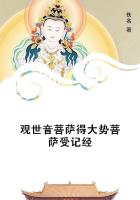There seem in the mysteries of savage races to be two chief purposes. There is the intention of giving to the initiated a certain sacred character, which puts them in close relation with gods or demons, and there is the introduction of the young to complete or advancing manhood, and to full participation in the savage Church with its ethical ideas. The latter ceremonies correspond, in short, to confirmation, and they are usually of a severe character, being meant to test by fasting (as Plutarch says)and by torture (as in the familiar Spartan rite) the courage and constancy of the young braves. The Greek mysteries best known to us are the Thesmophoria and the Eleusinia. In the former the rites (as will appear later) partook of the nature of savage "medicine"or magic, and were mainly intended to secure fertility in husbandry and in the family. In the Eleusinia the purpose was the purification of the initiated, secured by ablutions and by standing on the "ram's-skin of Zeus," and after purifications the mystae engaged in sacred dances, and were permitted to view a miracle play representing the sorrows and consolations of Demeter. There was a higher element, necessarily obscure in nature. The chief features in the whole were purifications, dancing, sacrifice and the representation of the miracle play. It would be tedious to offer an exhaustive account of savage rites analogous to these mysteries of Hellas. Let it suffice to display the points where Greek found itself in harmony with Australian, and American, and African practice. These points are: (1) mystic dances; (2) the use of a little instrument, called turndun in Australia, whereby a roaring noise is made, and the profane are warned off; (3) the habit of daubing persons about to be initiated with clay or anything else that is sordid, and of washing this off; apparently by way of showing that old guilt is removed and a new life entered upon; (4)the performances with serpents may be noticed, while the "mad doings" and "howlings" mentioned by Plutarch are familiar to every reader of travels in uncivilised countries; (5) ethical instruction is communicated.
First, as to the mystic dances, Lucian observes: "You cannot find a single ancient mystery in which there is not dancing. . . .
This much all men know, that most people say of the revealers of the mysteries that they 'dance them out'" ().
Clemens of Alexandria uses the same term when speaking of his own "appalling revelations". So closely connected are mysteries with dancing among savages, that when Mr. Orpen asked Qing, the Bushman hunter, about some doctrines in which Qing was not initiated, he said: "Only the initiated men of that dance know these things". To "dance" this or that means to be acquainted with this or that myth, which is represented in a dance or ballet d'action (). So widely distributed is the practice, that Acosta, in an interesting passage, mentions it as familiar to the people of Peru before and after the Spanish conquest. The text is a valuable instance of survival in religion.
When they were converted to Christianity the Peruvians detected the analogy between our sacrament and their mysteries, and they kept up as much as possible of the old rite in the new ritual. Just as the mystae of Eleusis practised chastity, abstaining from certain food, and above all from beans, before the great Pagan sacrament, so did the Indians. "To prepare themselves all the people fasted two days, during which they did neyther company with their wives, nor eate any meate with salt or garlicke, nor drink any chic. . . .
And although the Indians now forbeare to sacrifice beasts or other things publikely, which cannot be hidden from the Spaniardes, yet doe they still use many ceremonies that have their beginnings from these feasts and auntient superstitions, for at this day do they covertly make their feast of Ytu at the daunces of the feast of the Sacrament. Another feast falleth almost at the same time, whereas the Christians observe the solempnitie of the holy Sacrament, which DOTH RESEMBLE IT IN SOME SORT, AS IN DAUNCING, SINGING ANDREPRESENTATIONS." The holy "daunces" at Seville are under Papal disapproval, but are to be kept up, it is said, till the peculiar dresses used in them are worn out. Acosta's Indians also had "garments which served only for this feast". It is superfluous to multiply examples of the dancing, which is an invariable feature of savage as of Greek mysteries.
, chap. xv. 277.
Ap. Euseb., Praep. Ev., ii, 3, 6.
Cape Monthly Magazine, July, 1874.
Acosta, Historie of the Indies, book v. chap. xxviii. London, 1604.
2. The Greek and savage use of the turndun, or bribbun of Australia in the mysteries is familiar to students. This fish-shaped flat board of wood is tied to a string, and whirled round, so as to cause a peculiar muffled roar. Lobeck quotes from the old scholia on Clemens Alexandrinus, published by Bastius in annotations on St.
Gregory, the following Greek description of the turndun, the "bull-roarer" of English country lads, the Gaelic srannam: ". "The conus was a little slab of wood, tied to a string, and whirled round in the mysteries to make a whirring noise. As the mystic uses of the turndun in Australia, New Zealand, New Mexico and Zululand have elsewhere been described at some length (Custom and Myth, pp. 28-44), it may be enough to refer the reader to the passage. Mr. Taylor has since found the instrument used in religious mysteries in West Africa, so it has now been tracked almost round the world. That an instrument so rude should be employed by Greek and Australians on mystic occasions is in itself a remarkable coincidence. Unfortunately, Lobeck, who published the Greek description of the turndun (Aglaophamus, 700), was unacquainted with the modern ethnological evidence.
Pronounced strantham. For this information I am indebted to my friend Mr. M'Allister, schoolmaster at St. Mary's Loch.















